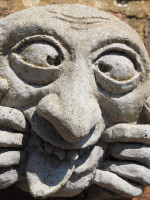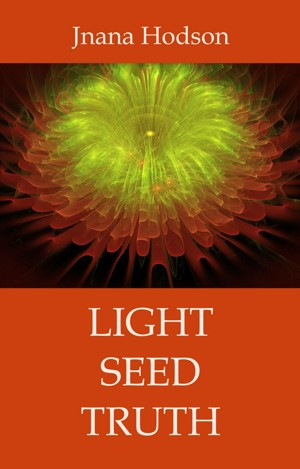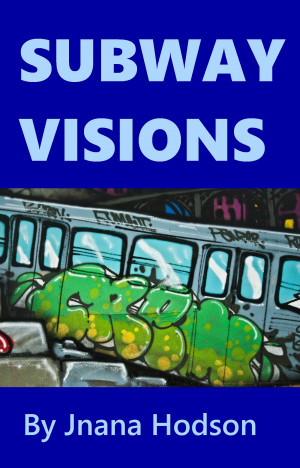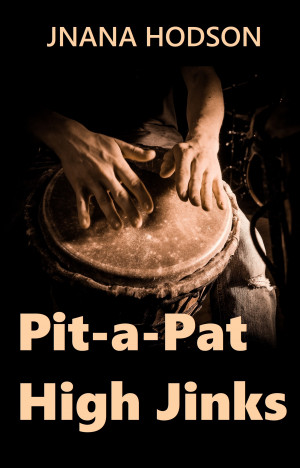Location: United States
Member Since:
May 16, 2013
6 readers have added this author as a 'Favorite Author'.
Jnana Hodson
Biography
It’s been a while since I’ve been known by my Hawaiian shirts and tennis shoes, at least in summer. Winters in New England are another matter.
For four decades, my career in daily journalism paid the bills while I wrote poetry and fiction on the side. More than a thousand of those works have appeared in literary journals around the globe.
My name, bestowed on me when I dwelled in a yoga ashram in the early ‘70s, is usually pronounced “Jah-nah,” a Sanskrit word that becomes “gnosis” in Greek and “knowing” in English. After two decades of residing in a small coastal city near both the Atlantic shoreline and the White Mountains northeast of Boston, the time's come to downsize. These days I'm centered in a remote fishing village with an active arts scene on an island in Maine. From our window we can even watch the occasional traffic in neighboring New Brunswick or lobster boats making their rounds.
My wife and two daughters have prompted more of my novels than they’d ever imagine, mostly through their questions about my past and their translations of contemporary social culture and tech advances for a geezer like me. Rest assured, they’re not like any of my fictional characters, apart from being geniuses in the kitchen.
Other than that, I'm hard to pigeonhole -- and so is my writing.
For four decades, my career in daily journalism paid the bills while I wrote poetry and fiction on the side. More than a thousand of those works have appeared in literary journals around the globe.
My name, bestowed on me when I dwelled in a yoga ashram in the early ‘70s, is usually pronounced “Jah-nah,” a Sanskrit word that becomes “gnosis” in Greek and “knowing” in English. After two decades of residing in a small coastal city near both the Atlantic shoreline and the White Mountains northeast of Boston, the time's come to downsize. These days I'm centered in a remote fishing village with an active arts scene on an island in Maine. From our window we can even watch the occasional traffic in neighboring New Brunswick or lobster boats making their rounds.
My wife and two daughters have prompted more of my novels than they’d ever imagine, mostly through their questions about my past and their translations of contemporary social culture and tech advances for a geezer like me. Rest assured, they’re not like any of my fictional characters, apart from being geniuses in the kitchen.
Other than that, I'm hard to pigeonhole -- and so is my writing.
Smashwords Interview
Where to find Jnana Hodson online
Where to buy in print
Series
Quaking
by Jnana Hodson
 Quaking Dover: How a Counterculture Took Root and Flourished in Colonial New Hampshire
Quaking Dover: How a Counterculture Took Root and Flourished in Colonial New Hampshire
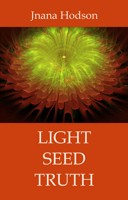 Light Seed Truth
Light Seed Truth
As a member of the Society of Friends, or Quakers, for most of my adult life, I've been nourished by a rich tradition that can be described as alternative Christianity, not that I would have considered the phrase when I began. How could I not write about it or the remarkable Friends I've known along the way in my relocations across the continent?
 Quaking Dover: How a Counterculture Took Root and Flourished in Colonial New Hampshire
Quaking Dover: How a Counterculture Took Root and Flourished in Colonial New Hampshire
Price:
$4.95 USD.
 Light Seed Truth
Light Seed Truth
Price:
$2.95 USD.
Poetry
by Jnana Hodson
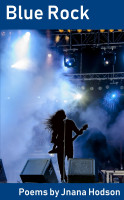 Blue Rock
Blue Rock
 Trumpet of the Coming Storm
Trumpet of the Coming Storm
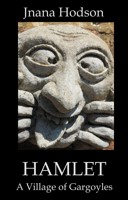 Hamlet: A Village of Gargoyles
Hamlet: A Village of Gargoyles
For me, poetry comes down to soul-speech. As you’ll see in these releases, each of my book-length presentations assumes a unique form and perspective rather than presenting a more traditional selection of a poet’s best recent work. Add to that my love of Ted Berrigan’s definition of poetry as a miniature windup toy, as well as mythopoetics and Robert Bly’s Deep Image approach. My subject matter can differ widely, but something more than a style or voice runs through them. As Psalm 119 proclaims, “My soul is continually in my hand,” reflecting everyday encounters and hands-on knowledge rather than a vehicle to ride through eternity. And I do write, after all, with my hand, as well as my head and heart. Strange to think now how much of my poetry springs from my yoga days, too.
 Blue Rock
Blue Rock
Price:
$2.95 USD.
 Trumpet of the Coming Storm
Trumpet of the Coming Storm
Price:
$2.95 USD.
 Hamlet: A Village of Gargoyles
Hamlet: A Village of Gargoyles
Price:
$2.95 USD.
Living Dharma
by Jnana Hodson
 Yoga Bootcamp
Yoga Bootcamp
 Nearly Canaan
Nearly Canaan
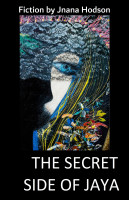 The Secret Side of Jaya
The Secret Side of Jaya
Jaya's life takes a sharp turn when she leaves high-rise Manhattan. First, in Yoga Bootcamp, there's the farm out in the sticks, the one led by a swami they call Elvis or else Big Pumpkin. And then, in Nearly Canaan, she ventures out into the prairie to resume her career in nonprofits management, not expecting to be caught up in hot romance or be swept to the desert interior of the Pacific Northwest. Along the way, in The Secret Side of Jaya, she discovers much more than meets the eye — especially the figures who intersect with her spirit. She's the heart of the three novels of Living Dharma.
 Yoga Bootcamp
Yoga Bootcamp
Price:
$2.95 USD.
 Nearly Canaan
Nearly Canaan
Price:
$3.95 USD.
 The Secret Side of Jaya
The Secret Side of Jaya
Price:
$2.95 USD.
Freakin' Free Spirits
by Jnana Hodson
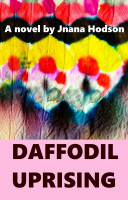 Daffodil Uprising
Daffodil Uprising
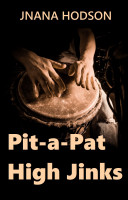 Pit-a-Pat High Jinks
Pit-a-Pat High Jinks
 Subway Visions
Subway Visions
 What's Left
What's Left
This freewheeling cycle pivots around a daughter's obsessive trips into her father's past after he vanishes in an avalanche when she's just 11. What she uncovers may seem a freaky world away from her own, as her sarcastic comments underscore, but each step points fatefully to her unique extended family and herself. Each of the four volumes stands on its own as he moves by steps eastward and then back to Indiana, where Cassia is born, grows up, and brings to light her own identity. Read them in any order you wish.
 Daffodil Uprising
Daffodil Uprising
Price:
$3.95 USD.
 Pit-a-Pat High Jinks
Pit-a-Pat High Jinks
Price:
$2.95 USD.
 Subway Visions
Subway Visions
Price:
$2.95 USD.
 What's Left
What's Left
Price:
$3.95 USD.
Books
Light Seed Truth
by Jnana Hodson
Series: Quaking.
Pre-release—available
June 7,
2024. Price:
$2.95 USD.
Words: 33,050.
Language:
English.
Categories:
Nonfiction » Inspiration » Spiritual inspiration, Nonfiction » Religion & Spirituality » Body, mind, & spirit » New thought
The use of metaphors can change your life. It did for early Quakers and the world around them. The metaphors of Light, Seed, and Truth turned religion and much more upside-down. They can do the same for you. This book delves into the how and why from their experience and today’s.
Hamlet: A Village of Gargoyles
by Jnana Hodson
Series: Poetry.
Pre-release—available
May 3,
2024. Price:
$2.95 USD.
Words: 21,880.
Language:
English.
Categories:
Poetry » American poetry » General, Fiction » Gothic
Gargoyles and grotesques are stone embellishments on real people and related creatures, however comical or absurd. But what differentiates an individual, anyway? Even you? The 200-plus poems in this collection began as an experiment in self-identity but grew into something much wider and perhaps more entertaining. How would you or I look in stone, anyway? Much less sound as a caricature?
Trumpet of the Coming Storm
by Jnana Hodson
Series: Poetry.
Price:
$2.95 USD.
Words: 13,230.
Language:
English.
Published: February 2, 2024
.
Categories:
Nonfiction » Politics & Current Affairs » Activism, Poetry » American poetry » General
Inspired by Dr. Bronner as much as Ginsberg, Whittier as much as Blake, the prophecy of Isaiah as much as Bob Dylan, this impassioned rallying call echoes a woodpecker’s rhythmic hammering away at decay and bugs in the rotting timber of recent public affairs. Global warming isn’t the only threat at hand as a catastrophic hour of reckoning approaches. Rap along if you can.
Quaking Dover: How a Counterculture Took Root and Flourished in Colonial New Hampshire
by Jnana Hodson
Series: Quaking.
Price:
$4.95 USD.
Words: 72,870.
Language:
English.
Published: September 8, 2022
.
Categories:
Nonfiction » History » American
(5.00 from 1 review)
Let me tell you about the turbulent rise and gentle decline of a distinctive subculture in New England. Mine is a partisan history of a group just up the coast from Boston, an unwavering bunch of folks who really rattled the Puritans. It’s the story of the Quakers in one town, then and now — America’s seventh oldest Quaker Meeting, centered in the nation’s seventh-oldest permanent settlement.
The Secret Side of Jaya
by Jnana Hodson
Series: Living Dharma.
Price:
$2.95 USD.
Words: 60,120.
Language:
English.
Published: May 31, 2020
.
Categories:
Fiction » Fantasy » Contemporary, Fiction » Visionary & metaphysical
Do you ever talk to animals? Do you ever talk to people who others don't see? It's one way Jaya stays sane amid the pressures of her daily endeavors — especially when they talk back. These three novellas reflect the local characters in the distinct landscapes where Jaya dwells after leaving the yoga ashram. No wonder their alternative awareness sustains her through daily turmoil.
Nearly Canaan
by Jnana Hodson
Series: Living Dharma, Book 2.
Price:
$3.95 USD.
Words: 130,550.
Language:
English.
Published: February 7, 2020
.
Categories:
Fiction » Romance » Contemporary, Fiction » Themes & motifs » Spiritual & metaphysical
Jaya is young, beautiful, and ambitious. She's also intent on bringing yoga into the heartland and beyond. What she doesn't count on is falling for a hot young waiter in a small town on the prairie. Their adventures could set off a volcano, especially once they resettle within one's shadow.
Yoga Bootcamp
by Jnana Hodson
Series: Living Dharma, Book 1.
Price:
$2.95 USD.
Words: 65,610.
Language:
English.
Published: September 10, 2019
.
Categories:
Fiction » Humor & comedy » General, Fiction » Inspirational
(5.00 from 1 review)
Welcome to a day in the life of eight young yogis who live under the guidance of a swami they also call Elvis or Big Pumpkin. Living together on a small farm not far from New York, they labor and learn in what they call an ashram. As they teach their guests, yoga is about much more than standing on your head. It's work — hard work — especially when it comes to caring joyfully for each other.
Subway Visions
by Jnana Hodson
Series: Freakin' Free Spirits, Book 3.
Price:
$2.95 USD.
Words: 38,190.
Language:
English.
Published: May 1, 2019
.
Categories:
Fiction » Urban, Fiction » Visionary & metaphysical
These underground urban adventures explore the mega-metropolis of Gotham upside-down. When a hick from the sticks like Kenzie is guided by two of his Buddha buddies and a tagger named T-Rex, the subway tunnels and elevated rails become a stage for celebrating the freaks and visionaries and dreamers who give a great city its kinetic vitality. Here's to trips that outweigh the usual destinations.
Pit-a-Pat High Jinks
by Jnana Hodson
Series: Freakin' Free Spirits, Book 2.
Price:
$2.95 USD.
Words: 103,550.
Language:
English.
Published: January 15, 2019
.
Categories:
Fiction » Coming of age, Fiction » Alternative history
Heading for the hills after college, a brokenhearted Kenzie takes up with awesome freaks, sexual misadventures, Tibetan Buddhists, secluded nude swimmers, and general badassery through peak experience after peak experience, as well as a cluster of dark pits in between. Cosmic corn-on-the-cob, anyone? (Be advised of its graphic adult content reflecting the Revolution of Peace & Love.)
Daffodil Uprising
by Jnana Hodson
Series: Freakin' Free Spirits, Book 1.
Price:
$3.95 USD.
Words: 136,190.
Language:
English.
Published: September 15, 2018
.
Categories:
Fiction » Coming of age, Fiction » Alternative history
As his daughter discovers, Kenzie and his buddies didn't set out to become hippies, but in the face of the old-boy establishment and its war in 'Nam, their hippedelic transformation was a natural outcome. Even for a geek like him, even in Indiana.
Nothing remained the same in the aftermath, for sure.
What's Left
by Jnana Hodson
Series: Freakin' Free Spirits, Book 4.
Price:
$3.95 USD.
Words: 119,160.
Language:
English.
Published: January 2, 2018
.
Categories:
Fiction » Coming of age, Fiction » Themes & motifs » Crime
Recovering from a deep emotional loss can feel like forever. In "What's Left," everyone loses something – especially when you're just 11 when your father vanishes in an avalanche.
Hometown News
by Jnana Hodson
Price:
$3.95 USD.
Words: 78,730.
Language:
English.
Published: September 2, 2014
.
Categories:
Fiction » Humor & comedy » Black comedy, Fiction » Historical » USA
They had hoped to transform their town and its newspaper, but a band of young, idealistic reporters, photographers, and editors at one family-owned daily newspaper recognizes that their small industrial city – like the rest of the American heartland – is at the mercy of forces far beyond its border. Consider this a report from Trump country.
Blue Rock
by Jnana Hodson
Series: Poetry.
Price:
$2.95 USD.
Words: 8,310.
Language:
English.
Published: May 12, 2014
.
Categories:
Poetry » Contemporary Poetry, Fiction » Romance » Contemporary
After appearing widely as selections in literary magazines around the world, the 80 love poems in this series now stand for the first time complete. Just listen and sway to their blues and rock. Perhaps even admire their diamond. It's passion, after all, and sometimes betrayal. Frequently, they play out in two voices in different keys that ignite in the rocky night or distill in the blue morning.
Jnana Hodson's tag cloud
60s adventure
70s
alternative christianity
buddhist
business
christ in us
climate crisis
college boys
colonial
comedy
community
community life
consciousness
country living
dating
dreamers
equal rights
escape
exercise
faith
families
family
fitness
food
free and easy
friends lovers
friendship
frontier
greek
gypsy
healing
health
hippie
history
hitchhicking
hitchhiking
human equality
humor
indiana
individuals
industry
inequality
jobs
journalism
kokopelli
labor
love
lovers
management
marriage
meditation
metaphor usage
modern history
mysticism
nature
neighbor
neighbors
new adult
new age
new england
nyc adventure
nyc subways
orthodox
outdoors
paranormal
passion
peace and love
peace movement
phantom
poetry
politics
quaker
relationships
revolutionary
romance
satire
self awareness
self discovery
self esteem
selfimprovement
seventies
sex adventures
sixties
small town
social justice
spiritual growth
spiritual walk
spirituality
strong women
subway
subway fantasy
subway stories
supernatural
theology
us politics
violence
wealth
weird fiction
wellbeing
wilderness
workplace
yoga
Jnana Hodson's favorite authors on Smashwords
Michele Miles Gardiner
Latest book:
Craving Normal: An Ordinary Life Veers Off Track...Way Off.
Published March 15, 2019. (5.00 from 1 review)
Published March 15, 2019. (5.00 from 1 review)
Sally Ember, EdD
Latest book:
This Is/Is Not the Way I Want Things to Change.
Published December 8, 2015. (4.00 from 1 review)
Published December 8, 2015. (4.00 from 1 review)
Smashwords book reviews by Jnana Hodson
-
Hippie Notes: Confessions of an Aging Forest Hippie
on May 21, 2019
These field notes are the real thing when it comes to exploring the wild. Fred's repeated ventures on foot and bicycle wheels into a small stretch of the San Gabriel mountains just northwest of Los Angeles lead us not just to face-to-face encounters with bears, rattlesnakes, and mountain lions but far more dangerous creatures recklessly toting guns or driving. Reading these observations had me feeling like I was sitting around a campfire and listening to experienced fellow hikers and backpackers swap stories. For some readers, "vagabond" might be more suitable in the title than "hippie." But he does know how to survive in the wild, even without much in the way of gear.
-
Wasted Year: The Last Hippies of Ole Miss
on May 23, 2019
This is a laugh-out-loud funny novel, beginning with Douglas Gray's "wasted" part. Think Southern Comfort and collegial. There's something timeless as Gray gets the conversational tone right, with a youthful innocence and resignation, while nailing the Deep South, which hippies pretty much avoided. I like having Baptists and a squirrel among the bad guys. "Wasted Year: The Last Hippies of Ole Miss" is a generous epic (two to three times the size of a typical novel) revolving around a college town in the early '70s, as much of the hippie movement did at the time. I can see why Gray first serialized on his blog. It has that kind of day-book flow.
-
Going for Broke: Travelogs on Becoming a Buddhist Monk
on June 06, 2019
The young American who leaves his lucrative computer career in Connecticut to become a Buddhist monk in Asia is roughly the same age of Cassia in my novel "What's Left," and his training likely parallels what her father would have practiced a generation earlier. No wonder Bhikkhu S. has my attention. Related in letters home, the travelogue is charming, innocent, and unpresumptuous, a delightful read. The opening chapters are a wide-eyed account of his adventures in Hawaii, Fiji, New Zealand, and Australia before settling in to his strict monastic discipline. It gives us a good sense of what he's about to give up, and what he will gain in contrast. His journey then turns to Hong Kong, India, Nepal, and Indochina. While dwelling in a monastery in Thailand, he explains his reasons for committing to a five- or six-year training in Theravada Buddhism, which differs from Tibetan or Zen. As he details, hard chores and community are big components in the daily routine. There are additional twists, of course, in the steps leading him to see with a new clarity and focus. He does a fine job of humbly trying to explain what's ultimately inexplainable and why he finds it so rewarding. Steve Scena's editing deserves kudos for keeping the first-hand feel of the on-the-fly material.
-
The Subway Diaries
on June 07, 2019
I'm surprised there aren't more stories told from the underground rails, considering the millions of people who ride them daily. It's a perfect place for peoplewatching – as Heidi Kole remarks, all the while being watched yourself. Here's a delightful example of a slice of that life seen by a singer-songwriter who took to busking in the depths of Manhattan from 2005 through 2008. It's a detailed account of her growing fondness for the gritty platforms and passageways even in bitter cold or steamy seasons, for her fellow artists who bring touches of comfort to people on the run, for the differing natures of the neighborhoods overhead, and for unexpected touches of kindness and encounters with eccentric individuals while dodging wandering cops too willing to hassle and haul off struggling musicians. Her chance introductions lead to a colorful cast over time.
-
Growing Up Wilder
on June 08, 2019
Like Cassia in my own novel, Dancy Wilder is trying to make sense of her father's hippie identity. The two plots, though, veer off in much different directions, despite the Greek goddess and her magical food in the opening chapter. Cassia's dad becomes a practicing Buddhist, while Dancy's Everett Wilder continues in a sequence of amorous partners while trying to raise two daughters as a single parent. Only a few pages into this book, I was entranced with the tale. It even has a family restaurant, as does mine, although the Darcy and her older sister, Marla, never work there. How can you not savor a line like this, regarding the Greek: "Wearing the shawl Marla and I had loved so much … she smelled of vanilla and rain." Quickly, though, the focus is on the two sisters themselves – and their relationship with their biker mother, who had moved from their home and the man who still loves her. The book is poignant, insightful, and oh, yes, humorous, too.
-
Traditional Greek Dream Oracles
on June 10, 2019
Dreams can be some of the best movies you'll ever view, and they're highly personal. This collection, largely adapted from the author's grandmother and her generation, is an alphabetical array of images and themes from a traditional Greek point of view. Somehow, it reminds me of Samuel Johnson's dictionary of the English language, full of opinions and quirks, or some of Jorge Luis Borges' fantastical gleanings. Where else would you learn this: "To dream of frogs indicates a period of anxiety and nervousness. If you can hear them croaking, it denotes there is a lot of gossip about you. If you kill it, you will be happy in love." As for a room? "If you get into an unknown room, it means that you are curious and indiscreet; remember that other people's private life is none of your business. If the room is empty, you might get into trouble for nothing. A small, stuffy room foretells an imminent danger. A hotel room denotes a new love affair that won't last." There's much more in this vein. I can image Cassia, in my novel "What's Left," hearing this from a great-grandmother or her Thea Pia. Alas, I'm not finding much that fits my usual dreams – delays in getting to the airport, being required to perform tasks on computers without having been trained in the new software, or even trying to order food in a diner. But reading of so many things that don't show up in my dreams does have me wondering what I'm missing. Ferris is also the author of two fantasy novels – both in Greek – and a collection of stories in English.
-
The Mushroom Diaries
on June 11, 2019
I've long viewed subterranean transit with a surrealistic twist, something Dominic Lyne advances with his account of psilocybin-enhanced trips in the London Underground, 2004 and '05. Unlike many riders who endure the subway as a kind of purgatory or at least in some numbed daze, Dominic and his buddy/lover Sam set out to observe the trains and their fellow travelers with an intensified awareness. They're youthfully arrogant, even cruel in their asides, brilliantly so, sometimes utterly misogynist in their brutally candid impressions, but they are aware of how freakish they, too, appear to others in turn. "Druggies," as one voice sneers to the rest of the car. Maybe, but that may be better than drunks, as I've also encountered. These are shared trips, in more ways than one, especially when the prose runs at a mesmerizing, blurring speed. For readers more familiar with New York's MTA, the London Tube may come as a surprise. Let's just think of it as a world of its own.
-
From My Balcony
on June 12, 2019
I've never liked the "coming of age" label for fiction, maybe because any genre seems to pigeonhole and then limit the content. But this book has me thinking that it's not always about being young – say your college years or shortly thereafter. Why can't the awakening come in midlife or even later? This is a beautiful, compelling, and well-written story built on the common premise of taking off for a year in France or Tuscany or maybe even India and perhaps even finding true love. In this case, throw in a bitter divorce and its heartbreak as well as the children and grandchildren you leave behind. Who cares if you're already in your 50s? Especially when it's an obscure town on the Cote d'Azur? Call it a sabbatical, if you will or a time of self-discovery. Yes, you could argue that too many good things arise in a fairy-tale rightness but I find them memorably and poignantly counterbalanced. As for the inevitable romance? Why wait for the movie? This one is sweet.
-
The Buddhist Tradition of Tibet
on June 13, 2019
Tibetan Buddhism runs through three of my Freakin' Free Spirits novels, though I refrain from getting into its technicalities. So I'm looking for a book to recommend to readers who want to know more. In the isolated mountainous elevations of Tibet, Buddhism took on a unique emphasis and identity once it was introduced in the 8th century C.E., nearly a millennium and a half after Buddha's life and the spread of his teachings elsewhere in Asia. Within the Tibetan branch emerged four major lineages, each with its distinctive and often secret practices and teachings. This book lays out each of those by naming the masters and their principal disciples, along the with titles of their writings or surviving techniques and instructions. The sequence of named teachers becomes quite confusing, especially when there's an assumption that the reader knows what terms like shravakas, pratyekabuddhas, and boddhisatvas actually mean. One thing that becomes clear is that Tibetan Buddhism is a highly scholarly and literary affair. Garab Dorje, for instance, "wrote down the 6,400,000 verses of the Dzogchen tantras, Manjushrimitra divided them into the three categories of Mind, Space, and Pith Instructions, and Shri Singha classified the Pith Instructions into outer, inner, secret, and innermost unexcelled." And so on. This overview may be suitable for a follower already immersed in the teachings, but for the general reader the presentation quickly tangles. Alas. What we don't get is a clear understanding of the essence of these lineages – how they differ or why. Obviously, the differences are important, but we're given no understanding why.
-
Erinyes
on June 14, 2019
Now that Cassia and her Squad in my own novel had dubbed their three evil great-aunts the Erinyes, after the Greek furies, I just had to see how another author would apply the mythological concept in our own time. His is less stone-cold imposing, for one thing, rather than three. And his is definitely more terrifying. George Saoulidis starts with his protagonist Mahi, a slightly spoiled modern teen growing up in a posh part of Athens, one with a suitably snarky tongue that matches other modern teens almost anywhere. Still, he upholds a geographic base. To think, I learned the word skata in the third paragraph from his little darling. (Look it up online, if you want. It will come in useful.) Ditto with more Greek slang that (delightfully) follows. This novel flowers builds on the nearly universal smartphone culture of teens everywhere except maybe some deep, dark jungle. In this book, I'm learning digital details without having to consult my own kids. He does that part right. And then things turn really weird, starting in a plausible sequence that gets truly cyber-creepy once the Erinyes swoops in. If it weren't for Mahi's two closest geeky friends, she'd be lost to the great viral evil that takes over her life. The short chapters move quickly, telegraphically, or maybe more like text messages. Some of the originally Greek is translated into faulty (British) English, but it's worth making some allowance in usage. This book still snaps, crackles, and pops – even if I do feel like some kind of Neanderthal, as Mahi would say. The ending, though, leaves me dangling. I want some relief. Will the other volumes in Saoulidis' prolific the God Complex Universe wrap this up? From the blurbs for the other stories, I'm doubtful.
-
Confessions of a Do‐Gooder Gone Bad
on June 15, 2019
These candid and often humorous presentations of growing up in a strict fundamentalist family in southern California in the '60s and '70s land on target. Her family may have defined itself as evangelical, but I'll quibble. Still, Howley describes experiences much like my own in Ohio a decade earlier, though we were more mainline Protestant and I had only a sister rather than four siblings. What we get from the outset is a sense of the perceived threat of everything the hippie movement represented – a view that quickly extends to anything beyond the family's embattled circle. Her father, especially, comes off as a one-dimensional patriarch, and I wish for more understanding of him as a person. We do get some strong glimpses into his insensitivity as a husband, but nothing of him as a tragic figure. On the other hand, I expected the author to flee into psychedelic release at the earliest opportunity. It turns out she's too prudent for that, though she does move into the wider world without ever really turning "bad." Oh, sigh. I also anticipated that her religious training might have led her into social activism of some kind, as the word "do-gooder" often conveys. Not so, though she wasn't a "goody two-shoes," either. Somehow, the Mobi edition I was reading was laced with bothersome hyphens in the middle of words. I allow a degree of grammatical and typographical errors in self-published material, but the excess here needs to be flagged. The hyphens turn into a kind of stutter. Howley's memoir cracks through the sugarcoating of sit-coms set in the era. She catches the angst of trying to navigate social circles and make sense of a subculture (to my mind, at least) gone astray. I'm left feeling she has much more to say in this vein, especially in light of her years since childhood and adolescence. I hope she goes for it.
-
Silicon Valley Monk: From Metaphysics to Reality on the Buddhist Path
on June 16, 2019
He's married and technically maybe not a monk, at least in some circles, but Kempf has been at Buddhism since the '70s – about the same time I took up yoga in an ashram and the spiritual path that's followed. That's where we begin. While relating a two-week group pilgrimage to historic sacred Buddhist sites in India that he undertook with his wife in 2010, Kempf diverges to detail much of his earlier experiences in the tradition and to reflect on ways the practice and teachings have interacted with his daily life on the frontiers of high-technology. So it's not exactly a travelogue or a systematic presentation of Buddhist thought, but more down-to-earth in a dry telling that touches on both and much more. His presentation of early Buddhism and its founder, the Buddha Gautama Siddhartha, is more understandable than others I've read, and includes connections with Greece and the West that remain provocative. He clearly explains ways the Pali-based Buddhism of the south differed from the northern Sanskrit-based branch, both developing immediately after the time Gautama's death. The guided tour itself is worth following, especially considering the hazards of driving in India's traffic and masses of beggars. Fellow travelers, of course, provide fascinating asides of their own. And then there are incidents of coping with the impact of overpopulation and the ravages of time. Kempf repeatedly wonders about how different these places are now from the way they were at the time of the Buddha. I'm comforted to realize his insights might not be that different from those Cassia's father leaves unvoiced in my Freakin' Free Spirits novels. By the way, this is my first ebook encounter with footnotes – Kempf's are easy to navigate.
-
Craving Normal: An Ordinary Life Veers Off Track...Way Off
on June 17, 2019
"Normal" is a big question for Cassia in my own novel, so this memoir of growing up on the heels of the hippie outbreak quickly commands my attention. Somehow, much of my ebook reading lately comes out of California, and this one starts out in the San Francisco Bay Area before taking off into a two-year nomadic jaunt in Europe with her parents and younger sister. Their travel on the cheap could be a dream of a lifetime for many, though there are some perilous incidents. It's their return to the States where Shelly, as she was known, runs into social struggles. She just can't fit in, from first grade on. It's not really her fault, either. She's handicapped by her parents' many eccentricities, from the clothing she's given to the school lunches they pack for her to a chasmic ignorance of the TV shows her classmates have been watching. After a fast start, the text becomes a series of flash chapters prompted by a snapshot or two that follow. I am curious about how to format the pictures in an ebook, but that's another matter. At this point, this book runs along like photo captions. The tale picks up once she starts evaluating the inappropriate sex messages her parents and the mass media were providing, and then her recognition of her old-fashioned grandparents as an anchor of propriety and secure expectations on the weekends – essential boundaries for a child in contrast to the "if it feels good, do it" fog at home. She had good reason to see through her parents' hypocrisy as hippies, especially her father's tightwad, control freak nature, along with its tendencies for violence. Especially valuable are the reason's Michele gives for turning away from her parents' generation – the hippie movement's ultimate breakdown in failing to pass the promise of revolution along. The outbreak of AIDS was only part of the wakeup call. After that, the subtitle, "An ordinary life veers off track … way off," takes on a richly ironic and rewarding meaning.
-
Saint Grotesque of the Subway
on June 18, 2019
Subtitled "The Girl or the Indigo Guitar," much of this slender volume wanders about like someone privately picking in curious wonder at the tuned strings without actually playing a song – all while grooving along some underground subconscious. I soon found myself thinking of Richard Brautigan or even Leonard Cohen. None of it takes place in Toronto's subway itself, but rather a small, nearly abandoned church beside the route and a few other locations nearby. It's a gentle, wistful, conversation that floats like fog before drifting off into prose-poems, and by then any semblance of plot or chronology has vanished. Thoughts of God and angels flitter through the impressions. I was charmed by this entry, but realize it will likely perplex most readers.
-
MNPB (Midnight Peanut Butter)
on June 19, 2019
This unconventional creation is like eavesdropping on whatever four teens are busy sharing via their thumbs and smartphones during their last five days of high school. Capturing their mundane but slang-infested exchanges is an ambitious literary achievement, one that its young Australian author augments by giving each of the voices a distinctly colored typeface – orange for RULR, green for WindDemon53, purple for WhisperOnTheWind, and dark red for notthatkindofcool. In some ways, the genre-defying novella reads more like a theater script or a graphic novel sans drawings. The big question is whether there's enough tension to sustain the reader. Still, Midnight Peanut Butter is weirdly funny, as intended.
-
The Umbrellas of Tokyo
on June 21, 2019
This easy-going short story revolves around a young American singer in Tokyo and a stranger she encounters on the subway, where nearly everyone carries an umbrella. It makes for a delightful mix that can't help ending on a high note.
-
The Story of Awkward
on June 23, 2019
Self-image is a major concern for adolescents, and I'll venture it's almost universally on the negative side. Is anybody really "just right," much less perfect? And how much of that image is instilled by criticism from others? As the title indicates, this story runs with the label of awkward. Not just physically, but in things like dating, too, as Perri grows a bit older. The way she survives the bullying and torments is by drawing fairytale figures in an imaginary world, even when her best friend's caustic brother enters her life. And what happens after that? "This is almost worse than having someone read your diary," she admits when she's swept away into her dream world with Foster. It's hardly as tranquil as she envisioned. Living with the characters she's created presents its own problems, ones that erupt into a cosmic struggle of psychological and mythological dimensions. Leaves me wondering about living with the characters we create with ourselves and those around us, too.
-
Sunflower: A Novel
on June 24, 2019
California again, right after Altamont, billed as Woodstock West. Sunflower is Penny's new name, and part of her new identity. Hippy, as it's spelled here. The novel cruises through its opening episodes with a sense of trying to play hopscotch, landing on all the right topics of the era – violence and nonviolence, racism, drug dealing and partying, sex with strangers, unwelcome sexual innuendo, the straight parents back home, 'Nam and its nightmares, campus protests, hitchhiking, abusive cops, a commune, idealism and cynicism – but much of the telling feels perfunctory with dialogue that's largely filled with dialectical and pedantic argument. The narration also gets tangled in shifting tenses, and the formatting itself goes wonky, alternating from one typeface to another and back. But a third of the way into the book, the plot picks up speed and gains depth, especially when it gets to Greece (another of those unintentional recurring themes in my reading) and then leaps on to India. I should note that in a typical hippie-era novel, an inevitable stream of references to rock songs and singers or bands appears as a kind of required in-text footnoting, and this tale is no exception. In the end, though, this text becomes an astute critique of the outbreak rather than its celebration – concluding with a crucial decision in a high place, the Himalayas, in its air of clarity.
-
Nice Girls Can Be Nudists Too!
on June 25, 2019
Considering all of the al fresco naked swimming that takes place in my "Pit-a-Pat High Jinks" novel, it seemed fitting I take a look at this entertaining compilation of short articles and updates. Egger presents a very British and entertaining argument on the joys of going sans clothing, indoors and out – as well as some of the tribulations, such as an invasion of frogs or sitting on vinyl upholstery or the unending titillation that's stirred up in others once they've labeled you. I wasn't expecting all the gradations in nudist or naturalist circles, some of them rather blatantly scandalizing to the author and her ex-paratrooper husband. The list of physical threats posed by clothing came as another surprise. Zippers an bras can be quite annoying, but to be injured by them is truly scary, male and female. Although some of the chapters feel dated, Egger covers (or uncovers) a variety of related topics: social situations where dressing may be preferred, the origins of Peeping Tom, the percentage distributions in sizes of male and female pertinent anatomy, participating celebrities and historical figures and their eccentric tastes, health benefits, clubs and resorts, computer chat rooms and niche websites, conversational bores, bad television programming and prurient producers, zany laws, famous artist's models, Naktivists, swingers versus naturalists, and growing old disgracefully. What more could you want?
-
Chillun Got Shoes
on June 26, 2019
A mysterious series of shoes abandoned in Washington's normally antiseptic subway stations has detectives turning to a psychic for answers. First, there's a tape recording of a father and son's trip on the Metro, "Down There," as the spooked child labels it. By the way, the descriptions of DC and Detroit are apt. The flip side is told by the father's friend Larry, who visits to see if the kid's tale is true. After that, the psychic goes underground to investigate. The scene turns truly terrifying, with evil energies or presences swishing through the tunnels. The fast-paced ebook has some annoying formatting issues, and this subway-loving reader is left awaiting some resolution regarding the unleashed forces themselves.
-
Creatura
on June 27, 2019
Paranormal is not among my usual genres to read, but this one had enough parallels to Cassia in my own novel I had to give it some attention. I'm glad I did. Arising in a 17-year-old's troubling nightmares, plus the boyfriend who just dumped her after three years as well as a psychiatrist who's also her best friend's dad, this story has a rich brew from the git-go. There's also a father who died when Isis was only 12, right after the divorce. As Isis Martin tells her friends at one point, if she could only sleep through the whole night, "My life could go back to being normal." (Ah, that "normal" question again. Another of those overlapping considerations. Not just for teens, either.) Nely Cab creates a compelling, fast-moving, high-current romance, even before getting to the main theme of forbidden young love – think Romeo and Juliet with a Greek god and a very wary south Texan girl. As for that ex-boyfriend? You really think he'd be gone forever? Isis' mother, meanwhile, has reason for concern, considering that she was roughly the same age as Isis when she gave birth. The book is dazzling, glittery, and sometimes terrifying, right up to the unexpected jolt at the finale.
-
My Mama's Tamales
on June 29, 2019
Food, an ethnic identity, and a father who died early in a daughter's life are three things Rosario in this novel and Cassia in my own have in common. But this one takes me in many fresh directions. As a child in El Paso, Texas, Rosario poignantly desires to have a mainstream family like television's Brady Bunch and to enjoy all of the products she sees advertised rather than those arising in her own hard-working, frugal Mexican culture. She's ridiculed and tormented by bigoted teachers and classmates alike for her difficulties in adapting to their incomprehensible conventions. The messages she's given speak only of the presumed inferiority of her people and herself. Yet no matter how much she wants to move away, she cannot deny the underlying vibrancy of her extended relations at home and across the border. The story is told with a zesty sprinkling of Spanish words and phrases drawn from real life rather than those taught in language classes, all used in ways that add understanding and spice to the narrative. Much of the final third, encompassing her college years, is an unabashed polemic cast in fiction, a critique of American society from a non-white perspective. It's well worth listening to. This is, after all, a deeply personal confession.
-
Tales of Zen Buddhist Scoundrels
on June 30, 2019
Resounding like a collection of brief Zen master vignettes, usually with a baffling twist at the end, these inventive, contemporary tales ring right. The unexpected settings include golf courses, gaming rooms, and taverns. Throughout, I often found myself caught off guard and laughing. And those who come along to debunk the Zen practitioners are themselves debunked till nothing's left but a Void vision.
-
My Lebanese Father and Mother's Immigration
on July 01, 2019
Cassia's great-grandparents in my own novel came to America in the same decade described in this family history of another arrival from the eastern Mediterranean. After hearing a good friend tell of her own parents' origins in Lebanon, I imagine many of the experiences are common to immigrants from throughout that region. Baldwin's Greek Orthodox parents knew persecution from the Turks as well as the terrors of famine. Her grandfather's village dispatched him to America with instructions to send money home to enable their existence, which he faithfully did. From what I've read elsewhere, it was a common practice in the years leading up to the First World War. With a few quick strokes, Baldwin answers questions I've had about details of getting to the New World and then surviving in that period, especially once he's directed to Nebraska, of all places. I am curious how she gleaned many of the bits from her father but am grateful she captured them. Yes, many questions still remain (how did the money actually get safely back home, for one thing – we assume many things today that might not have fit then). In her simply told account, Baldwin does not gloss over the difficulties of adapting to a new world and its conflict in her father's values, much less the tyrant he turned into at home. These are the real history at a personal level. Many similar family narratives need to be recorded and saved while participants like Baldwin still remember. Elias would have been 121 years old when this book appeared. Without her, his voice and adventure – and his wife's – would have faded into oblivion.
-
The Eighth Circle of Subway
on July 02, 2019
This futuristic nightmare is set about 40 years after a Russian subway system (and presumably the world's others, too) have been deformed into a deadly gauntlet through dystopian cyber-hacking. The tale follows an underground stampede for survival by Eddy and a group of other "guys" (the word is overused, even in such a short story) as they plunge through something resembling a horrifying subterranean funhouse or a dark computer game come to life. I'm assuming that Eddy's ordeal reflects a widespread but suppressed fear of underground transit systems, even for daily commuters. There's always some risk along the way, especially at the edge of the platform or entering and exiting a train. Oldie's inclusion of an oversized intestine as one of the passageways strikes me as apt in an otherwise mechanistic hell. Translated from Russian, the English and the action can be hard to follow even without "breaks" instead of "brakes" kinds of problems.
-
San Fran '60s: Stories of the Hippies, the Summer of Love, and San Francisco in the '60s
on July 03, 2019
San Francisco was Ground Zero for the emergence of the hippie movement, and this is one participant's experience at street level. In this fictionalized autobiography, Jacobs captures the underpinning of drifting and despair and cuts through the mass-media stereotypes, which he deftly critiques. Here, Haight Street can be the last resort when looking to fill an open day. And from the outset, there are the zombies and burnouts, boredom and paranoia, and a host of uptight realities. Not everyone gets laid regularly, either, but there is plenty of drug dealing and usage. Something definitely intense is driving these refugees from the suburbs and points beyond. It's not all peace and love, either. Any storyline tangles once the chapters start jumping away from chronology and, at times, from Haight-Ashbury. Characters who were written out of the story suddenly reappear, while others are added willy-nilly. The mobi formatting keeps shifting between two typeface sizes, and I found that as annoying as the grammatical errors and storytelling redundancies. There are also continuity issues, such as the sudden assumption the reader already knows about ex-lover Amy when she's first mentioned and then vanishes. Caught mostly in 1966-'67, the book is an important acknowledgement of the grim underbelly of a counterculture beginning to spread across the rest of the nation – excepting, as we're repeatedly told, the South and other redneck enclaves.
-
The Buddhist Coffee House
on July 04, 2019
A good daddy takes his two young daughters to Britain for a month in 2007, leaving his future ex-wife behind in South Carolina. If only the story lived up to the playful promise of the title. Alas, the redundancy of "novel tale" on the cover should have been the tipoff, lame pun that it is. The author repeatedly tries to be clever but keeps missing the mark. He winds up talking at the reader, rather than with us. The daddy, a public school history teacher, does provide a lot of arcane information along the way. The travelogue opens with his clumsy attempt to get a coffee refill on the flight over the Atlantic. As far as I can tell, the girls don't drink coffee, except for decaf. Neither, apparently, does the Buddha, at least not in this narrative. There is, however, a trippy trip to a castle once they've landed. Plus a week of camping at the ruins of an ancient priory. And rounds of tea and then the pub with four other daddies. And, yes, there are cafes in the story. As well as a subway. And European Buddhists, though he himself is Baptist. And he drinks his coffee sweet.
-
Turn, Turn, Turn
on July 05, 2019
Forty years after coming of age as a Long Island Jewish boy in the flowering of the hippie experience, these reflections follow the transformation of a shy, beer-guzzling frat brother into an acid tripster. Koller describes the LSD-induced awareness he felt clearly, recognizing that for him it was transformative, "like a secret door had opened up that had been waiting just for me." Ultimately, he declined to follow his highs into a spiritual practice he sensed was possible but instead chose to continue with drugs and "the ladies" – a routine that becomes tedious to follow. I'd be curious to hear their side of this guy-thing story. The missed opportunities work both ways. The memoir also bogs down in a slew of misspellings, grammar issues, and needless verbiage.
-
We All Want To Go To Heaven
on July 07, 2019
This is a rather short understated story about an online business involving weirdos. Initially, I was drawn in by the outspoken, paranoid, pot-smoking mother, but her two sons are the real focus. The tale caught me laughing out loud and could be the opening for a much longer account. I'd like to hear more about their mama, for one thing, but the book is offered at no cost, as is Smith's stream of other brief quirky fiction at Smashwords. Put them all together, and it promises a delightful collection.
-
Prelude
on July 08, 2019
I've heard that ancient Greek mythology is unique in having no Creation stories (not that I've tried confirming the claim), but this book attempts to shape one that spills over into our own time. Of course, Nely's cosmos is only vaguely about polytheistic faith but very much about humanity itself – passions and conflicts, especially, but also our shortcomings, including aging and death. And, yes, there is a lot dealing with sexuality. Her two central immortals are as tangled, it seems, as the couple in the Bible's Garden of Eden, except that her Deus and Starr go in a different direction. Nely's dream-like mythos is ultimately earth-focused, rather than cosmic, preparing to take its next steps in south Texas, of all places.
-
Fruit of Misfortune
on July 09, 2019
As part two of Nely Cab's Creatura series takes off, Isis lands in Greece and the plot takes a much darker turn. After the opening volume's heavenly romance escapes its dire threat, the evil potential of human-and-divinity comingling now comes to the fore. The consequences are very chilling, indeed. Think of diseases or addictions that change personalities. This is much more devastating, even without an annoying Eros refusing to get out of the poor girl's face. The fast-moving action kept me feeling queasy, but I couldn't stop reading. "Immortals," by the way, is a better way of considering polytheism than "gods." They have their flaws, too. Or perhaps especially.
-
Marker of Hope
on July 10, 2019
The action returns to south Texas for the conclusion of Nely Cab's the Creatura series, and here's where the author runs into trouble. While one half of the story tries to build on an aw-shucks Americana many of her readers would share, the other half stretches for an apocalyptic Star Wars finale. Pitching the future of all of humanity in a small-town conflict in the middle of nowhere is simply too much to sustain, especially with all of the deus ex machina thrown in. Despite the high conflict – and it's intense – there's no real question about the outcome. Meanwhile, in real life, we're facing matters of climatic instability caused by other forces in Texas plus concerns about the fingers currently risking nuclear annihilation, making Creatura's seem remote by comparison. There's no easy way out of this.
-
Lebanese Immigrant's Daughter
on July 11, 2019
Many Americans are surprised to learn of arranged marriages in the United States, even in our own time. I remember when an older friend told of being pressured by her father to break up with the man she loved and instead wed someone of her own culture. We were agog. In this memoir, Baldwin provides a close look at the expectations of the tradition, one she managed to escape before the vows were exchanged. Just as enlightening is her plainspoken description of growing up on an immigrant farm in Nebraska and her dual life between home and family and learning American ways.
-
Buddhism For Beginners: Learn The Way Of The Buddha & Take Your First Steps On The Noble Path
on July 13, 2019
(no rating)
She's read but has she practiced? This feels superficial.
-
Unhinged
on July 14, 2019
Yeah, they kept telling us our high school years would be the best of our life, but they lied. Fifty years later, as this novel relates, they're still lying. In this book, being on the football team doesn’t help, not when you have your own demons in addition to your derogatory dad. I have questions about some of the assumptions in the timeline – if it's football season, I don't see how Eddie has time for much else than games and practice. Still, the story delves into details of the dark, often violent, reality many teens face.
-
Karmafornia
on July 16, 2019
Berkeley, as might be assumed from the title, is the epicenter of this relationship of two opposites. She tries to warn him, of course, even before Cob takes control, making it two of a kind while the gentle Tao follower Walt patiently waits for his lover's return. The story is post-hippie with a tinge of punk, but ultimately searing. Oh, my, I've been in Walt's role.
-
The Goa Yoga School of Slayers
on July 18, 2019
This tale starts off with promises of improved sexual performance and a taste of Canada before zipping off to India, though it also starts to sound like Italy, as in her somewhat boyfriend, Dario. Not even one paragraph in, we're on a roll. It's not really about yoga, apart from a horrific guru who's more into illicit international trading, but this tale does fit into two genres, romance and detective/mystery, with a humorous touch at that. Plus a personal elephant. Not quite like anything else I know of.
-
Tales of Slot Machine Bodhisattvas
on July 19, 2019
Overlooking the irritating formatting glitches, this string of short religious confrontations is delightful and often laugh-out-loud insightful. Ka-ching, ka-ching, ka-ching, the odds run in your favor.
-
Meditation: The Essence
on July 20, 2019
There are far more ways to enter spiritual meditation than are presented here, and far more reasons to pursue the practice. After 50 years of the discipline, I know there's much more to be said, even from Tuffley's Buddhist perspective.
-
Yoga Guy
on July 21, 2019
A beginner's yoga class opens up more than a 35-year-old geek's chakras in this gentle awakening that extends to key people around him. It even includes some romantic lessons in home cooking. "Ta-da," as he cautiously lets go step by step and learns even from his mistakes.As luck has it, he's not the only one hoping for a new direction. It's almost too much of a good thing, if he doesn't blow it.
-
Mae Chee Kaew: Her journey to spiritual awakening & enlightment
on July 22, 2019
Renowned as a living female arahant, Thai Buddhist nun Mae Chee Kaew (1901-1991) was accomplished in meditation and visions from youth on. This is a lovely biography and presentation of her teachings, especially once she was able to take up full-time spiritual practice after the dissolution of her marriage. Like the monks, a nun, or mae chee, has a shaved head and wears white robes and lives a strict monastic discipline. This inspiring volume effortlessly explains Buddhism itself in the passing, as well as the experience of meditation.
-
The Yoga Divas and Other Stories
on July 23, 2019
I'm not sure how much of this is fiction and how much is memoir, but it is funny and acidly on target. The chapters follow a 40s-something divorced man named Rob, just like the author, in his social encounters, mostly with yoga women (the divas) north of Boston, not all that far from where I live, or off in Bloomington, Indiana, profoundly in my past. He knows the variety of name-brand teachings, for sure, as he hops from one yoga studio to the next before running off through a set of wild and often self-deprecating unrelated journeys far from the exercise mat. Somehow, everyone survives.
-
Journey Out Of Nothing: My Buddhist Path to Christianity
on July 24, 2019
My guru repeatedly said that yoga would take us back to our original religion, rather than away from it, which is what happened when I discovered my family's Quaker roots. In contrast, Roth grew up in an atheist household in New Zealand and took up Zen Buddhism while working as a journalist in Japan. His experiences ultimately pointed him to embrace his own Jewish and Anglican origins, similar to my own encounters. Roth's descriptions of the many streams of Buddhism he met with is a revelation and often a critical counterpoint. His book is a simply told account of discovery, disillusionment, and rebirth.
-
On Beyond Yoga
on July 25, 2019
There aren't a lot of novels about yoga — the books in front of the public are overwhelmingly serious nonfiction — but Brown's tale is a sex-laced except for the teacher, who is doggedly sexless. Here three men and a woman head off from Germany for two weeks in India a few decades after yoga had hit America and Europe. Each member of the party has different expectations of the pilgrimage, as they relate in their candid and often humorous confessions. Despite annoying first-person/third-person shifts and a few other glitches, this book remains a rich encounter with some of life's most enduring questions.
-
The Ongoing Relevance of the Sixties and Seventies and Other Essays and Memoirs
on July 26, 2019
Walters finds himself rooted in the '60s and '70s, a period he acknowledges as being both personally painful and life-changing. We have that in common. His title promises a much wider range of inquiry than these six essays deliver, but they do make for an easygoing pitch for his hippie-based novel "The Misadventures of Mama Kitchen" and related short stories, followed by mention of his memoir of hitchhiking in America and abroad, "World Without Pain." Nice to know they're available.
-
68½ - Movies, Manson & Me
on July 27, 2019
Starting in Bristol, England, in the summer of '68, this son of a flower child runs through the seamier side of the counterculture explosion with wildly opinionated perspectives, especially on movies and their casts, many of them largely unknown. Sometimes, it's briskly and refreshingly iconoclastic, stirring gasps of shock or outrage. There's no escaping his uninhibited egotism. (Just what was he on when he wrote this? For some of us, it might produce a contact high.) He still delivers some brilliant, passionate, and highly unconventional insights on the era. No wonder we couldn't quite get our act collectively together.
-
The Mustard Seed
on July 28, 2019
This novel opens on some dubious premises when it comes to the inside operations of a struggling Boston newspaper, but once the 37-year-old, fat sportswriter gets to Sri Lanka to cover a big soccer match, we're faced with a murderous dictatorial ruler and his terror. I picked this up thinking it would be a yoga novel. It's not, though the title comes from the life of Buddha. The eye-opening action runs right into clandestine guerrillas, government corruption, even prostitution in a Third World setting. It's an explosive brew.
-
Yoga The Movie
on July 31, 2019
If only the book had followed through with its image of being a movie, I'd be happy. Instead, what we have is mostly pricy raw footage without a clear sense of where it's going, something the author admits from the outset. Her effort to map the road to bliss as long stretches of hell unfolds as a monologue of intended comedy — a meandering, wordy blend of memoir, reflection, and forced humor. Besides, a movie really needs a star or two and some action. Yes, there are some redeeming insights along the way, but too often they get lost in the blurry verbiage. Too many sentences twist themselves into knots that have nothing in common with the most difficult hatha yoga positions. Cutting this to 90 minutes would help.
-
All Along The Watchtower
on Aug. 13, 2019
What gives in this mesmerizing weird historical fiction with a historic hippie beat, told with a crypto-Scottish brogue? I'm often not quite sure what's happening in the story as it traverses the American Far West, but the narrative is like something you might be swept along in while listening to the boasting in a smoky bar. That's assuming you don't drown in its ambitious gush of dialogue and flashing images as they cast a seductive web. Watch out.
-
From the Waters of Coyote Springs
on Aug. 14, 2019
This novel accurately nails the rugged and isolated life of a half-dozen loners deep in a Pacific Northwest wilderness. The small band is working on contract for the U.S. Forest Service a desert away from the population centers of Seattle and Portland, escaping something in each of their pasts. Of course, there's no real avoidance in such solitude. The events, relationships, and self-discoveries are tenderly and candidly revealed.
-
The Outcasts - A Thousand Dreams of Redemption
on Aug. 16, 2019
This beautifully told and nuanced story weaves through tropical sensuality, conflicted sexuality, Sufi and yoga spirituality, and emotional suffering in the heart of India. The beguiling prose opens with a possessed and tormented young wife's trials in an oppressive male-dominated culture before being abandoned altogether. Add to that a dying old man who finds new life as a wandering ascetic plus a transgender adolescent who joins him. The trio's journey is richly infused with perceptive wisdom, self-discovery, compassion, and transformation. It's magical. The footnotes, crucial as they are, feel annoying. Fortunately, there are fewer and fewer of them as the tale advances.
-
Bishop John VS the Antichrist
on Aug. 17, 2019
This is the middle volume of a promised trilogy by a Greek Orthodox writer now living in Canada. The story is very much about spiritual struggles in our own time – including temptations like movie theaters and washing machines and clothes dryers and then a peculiar man in their midst. Well, the first volume does feature zombies. El-Koura probes deeply into matters of faith and oppression.
-
Fates' Folly
on Aug. 18, 2019
In a tacky small-town Georgia, a somewhat frumpy but young art teacher finds a stranger in her second-floor apartment hallway. The only problem is that he's not exactly human. She may be sassy, but she's fated to an underworld journey, where all tarnation is breaking loose in a surprisingly flip way, turning classic Greek mythology upside down. So what if she's been warned against munching another honey bun, this is still tasty and sticky as hell.
-
Blood Debt
on Aug. 19, 2019
Finding a father whose identity had been hidden from her for all of her 22 years comes as a shock for both of them. But when she finally meets him and her five amazing half-brothers, everything's too glamorous to be quite right. She's swiftly immersed in a powerful and alien Greek mythos where events from before her birth are still in turmoil. Can this California girl adapt quickly to her new situation or will her unconventional values and actions prove fatal? Loyalty and duty run up against personal freedom while also being essential to her survival and destiny. Family stuff definitely gets messy, especially when rival sides are super rich and powerful. As one of my own characters who's lost her father also wonders, why can't our family just be normal? This tale turns out to be not just a big book but the beginning of a gripping series.
-
The Miami Trip
on Aug. 20, 2019
The flip conversational tone leads Dave and his girlfriend to a five-day cross-continent bus ride from North Seattle to three months of what's anything but a ritzy binge starting in South Miami. Duct tape holding their suitcases shut, a SWAT assault on their hotel, and mice infestations punctuate the memories. After that, most of the book is about their Greyhound seats home through the underbelly of America via a roundabout route. As a partner in all this, Kelley is constantly described as a knockout, but she doesn't say much, if anything. Does Dave even notice? My favorite parts are mostly in Seattle.
-
Beyond the Music
on Aug. 21, 2019
Ms Brown gets my attention by starting off about the same time Cassia's parents are coming of age in my own novel. This story takes off with one foot in Indiana, but teenage Ellen quickly has only mean things to say about the onset of hippies. Like Cassia, Ellen can be snarky. More points. And then everything Jacks up, in an easygoing sort of way, even if he is a hippie. But just what are his reasons for remaining so mysterious?
-
Crying Over Spilt Light
on Aug. 23, 2019
(no rating)
Advanced math and physics get wrapped up with a sexy Greek immortal in this cyberpunk novella, much to his torment. She, however, will stop at nothing to get the key he's developing on the whiteboard. If only she could get it from inside his head, everything would be different. She's a real femme fatale, as coldly calculating as his brilliant equation, the one she desires more than him.
-
Sharking Out
on Aug. 23, 2019
(no rating)
This very short story floats around a champion surfer's death and another's amorous desire, pointing one tragedy into another in the cresting Pacific waves. Chilling and to the point.
-
Poachers In Baby Venice
on Aug. 23, 2019
(no rating)
A real death rattles a virtual reality store. This cyberpunk tale's really weird, like a foretaste of now in our growing digital addiction leading to its own twists in asceticism. What if somebody pulls your plug?
-
The Acid Trips of Saint John The Divine
on Aug. 24, 2019
With this scandalous fictionalized take on the direct disciple of Jesus and oft-presumed author of the fourth gospel and the Book of Revelation, Thompson continues with his wild iconoclastic rips, this time flailing Christianity rather than Buddhism. Or, from another perspective, it's more the filthy rich and obscenely powerful he's excoriating in this wacko satire set on a Mediterranean island during the Roman Empire. It's sinful and sticky sweet, for sure, and in no way convincing, other than the lunatic laughter, but it might even make you want to read the Bible accounts to see what you've been missing.
-
Father John VS the Zombies
on Sep. 01, 2019
Having read the second volume in the Father John trilogy, I picked up the starting point, this one with the zombies. I've encountered a lot of atheists who are more afraid of a zombie apocalypse than eternal damnation, so Father John adds some timeless perspective by blending both into the mix. In the realms of utter misery, one of these would be over in a flash, unlike the other, right? Maybe not so fast, at least if you're a survivor, as this embattled circle huddled inside a Greek Orthodox cathedral must face. Who would have thought religion-based science fiction could be so thrilling? (OK, not exactly sci fi but close enough to count in its futuristic view.) The covers for this series, though, don't do the books justice.
-
Rock'N'Roll in Locker Seventeen
on Sep. 02, 2019
Like two of my novels, this one takes place in a sleepy college town in Indiana, and Brown lets a 17-year-old boy dish out the dirt as seen from the wrong side of the tracks there. While this was written as the first of Brown's two Ricky Stevenson rock star yarns, it's set chronologically later than the first, and I'd strongly urge you to read this one second – you'll catch more of the inside jokes that way. Quite bluntly, it's very, very funny, nailing Hoosiers (or folks you might know) better than even Vonnegut could. Makes me wonder what else might be lurking in those self-storage centers popping up all across the country.
-
Felix and Eve
on Sep. 03, 2019
The third of Ms DeVillers' novels advances Eve's unconventional life to age 37 as she takes a job as the live-in housekeeper for a 96-year-old tough cookie, Felix, while he recovers from a hospitalization. Her portrait of elderly survival is fine-edged and compassionate. What she uncovers under his gruff exterior makes for a very beautiful and emotionally moving stor
-
Barbie's Frolics 18 And Bi-Curious In 1971
on Sep. 04, 2019
(no rating)
Set in the same time as my own "Pit-a-Pat High Jinks," Barbie's Frolics presents another side of the spreading sexual revolution. There are some factual snafus from the gitgo – Barbie would have been the baby boomer, not her dad. Likewise, for the 35-year-old Frenchman to have a son in college lessens the credibility. Once Barbie gets going, though, we're given a fragmentary slice of small-town soft-porn exploration. You can imagine her moving on from there, for good reason. I'd bet Barbie headed north and became a hippie. For the record, it's quite a stretch from the author's prolific mobster and smut history publications.
-
Simmer (A Tori Nichols Escapade, Book 1)
on Sep. 04, 2019
(no rating)
This intro to the Tori Nichols series has the heroine rather mechanically losing her virginity to a childhood friend just before she graduates from high school. Somehow, I was expecting something quite different, more personal, even. The next three episodes promise to be much more erotic as her friend cranks up the heat. What's ahead also should far more ominous than this dry opening.
-
The Arrangement
on Oct. 30, 2019
"The Arrangement," the concluding work in Diane DeVillers' semi-autobiographical trilogy about an independent woman of counterculture values, brings Eve's life up to the present. The three books of the Eve Chronicles stand as a gem in the surprisingly small clutch of fiction that accurately depicts free-spirited life in the hippie era. Eve is not the stereotypical hippie chick – she's too strong-willed and clearheaded for that – but she has rejected the Midwestern norms of her upbringing as too hollow and set out in search of something more fulfilling. For her, that leads to long stretches as a forester in remote eastern Oregon and then as a caregiver in marginal locales closer to the coast. By now, she's a retired baby boomer – one who bailed out early – at last living a quietly bohemian life on the fringe of trendy Eugene. As DeVillers illustrates, there's much more to the Pacific Northwest than hip Seattle or Portland. (It's a major theme of my own, too.) In all three books, the author gently deflates stereotype after stereotype. Eve definitely has the vagabond identity that marks her as a hippie, but she's not that into drugs, is often celibate by choice (though she does enjoy sex, too), and is not especially political. She's a women's rights proponent who parries the crude comments of her male coworkers of a blue-collar type and has affectionate interactions with bawdy geezers. She may be seen as strong in her independence, but it comes at a cost and masks deep anxiety and much vague uncertainty. All of this is faithfully recalled and rings true. The twist in this novel is that she spends her summers in a studio apartment in a bungalow on Catalina Island in southern California. By arrangement, which costs her nothing but providing homecare for someone quite special in her life. And yet, how heavenly. This is a beautiful book, with deeply emotional touches that include a Vietnam war veteran's bottled-up anguish and a young neighbor child who shines despite her own suffering. Make allowances for some syntax slips and the like – this is a self-published novel – but have a box of tissues beside you toward the end.



